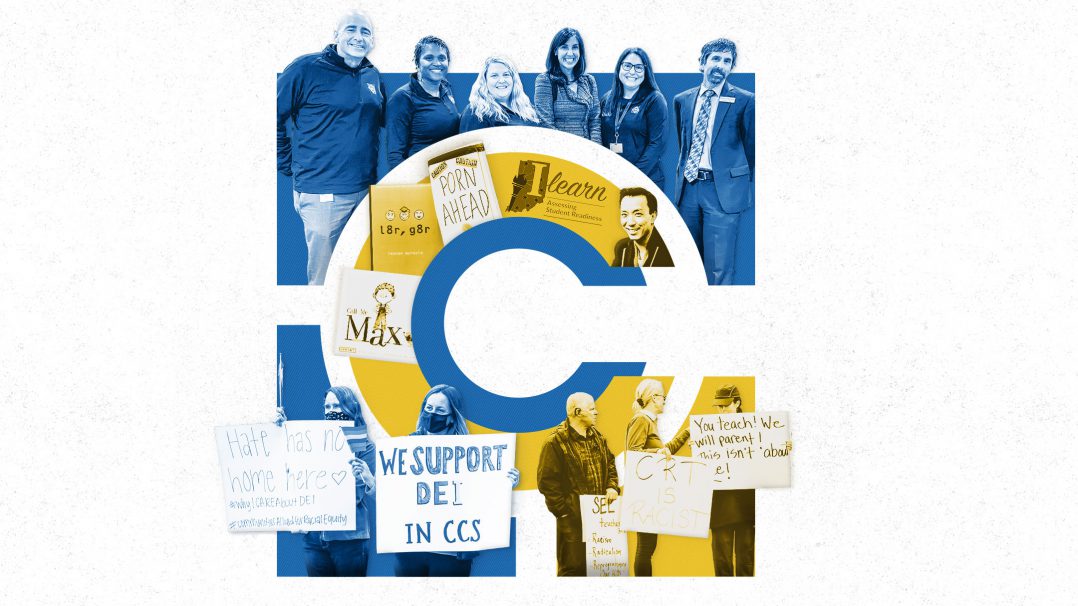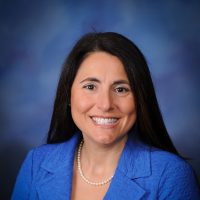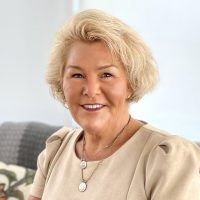
When Alvin Lui moved his family from California to Indiana in 2020, one of the main reasons was so his young daughter could attend Carmel Clay Schools, which appeared to be “one of the best school districts in the country,” Lui said.

But instead of enrolling his daughter in kindergarten this fall, Lui found himself as the president of the board of directors of Unify Carmel, a nonprofit formed in the spring with stated goals of promoting an increased focus on academics and parental involvement at CCS, in part by ending the district’s diversity and inclusion efforts.
The group, like so many others that have formed across the nation in the last 18 months, has made headlines by its tactics at recent school board meetings. Its members used the public comment section of the July meeting to read sexually graphic content found in books available to CCS students in school libraries. That demonstration largely contributed to CCS eliminating public comment at meetings, according to an Aug. 18 email sent to parents. Unify Carmel supporters protested that move and other concerns at the September meeting by presenting a loud, scripted conversation as the school board attempted to conduct business. That led to CCS suspending public attendance at meetings.
Lui said he’s fully aware that not everyone will agree with Unify Carmel’s “theatrics,” and that they may alienate some who agree with the group’s message. But if that’s what it takes to shock people into paying attention, he said he believes it’s worth the cost.
“We recognize that you can only ask so much of the public before the public gets sick of you. To be honest, I’m kind of sick of us, because it’s not natural to be in people’s faces like this so much,” he said. “Once we get past letting people know there’s something wrong with the school board, I’d like to see us get into more public service where we try to educate more than we’re trying to enrage. When you’re starting and you really need people, you have to do that.”
Those efforts have made an already difficult year even worse for school board members.
 CCS school board President Layla Spanenberg stated in an email to Current that it’s “sad any group would turn to theatrics to prove a point” and that school board members and district officials are willing to meet with parents to discuss concerns. She stated the pandemic and divisive environment have led to challenges like she’s never seen before during her 11 years on the board.
CCS school board President Layla Spanenberg stated in an email to Current that it’s “sad any group would turn to theatrics to prove a point” and that school board members and district officials are willing to meet with parents to discuss concerns. She stated the pandemic and divisive environment have led to challenges like she’s never seen before during her 11 years on the board.
“While we try to have a healthy relationship with our parents and community, we do see the comments that are allowed on certain social media forums that promote showing up to our houses or protesting on our lawns. We have had our home addresses posted on social media,” Spanenberg stated. “During school board meetings parents have called us names, yelled (at) and harassed board members going to their cars after meetings. This kind of environment is not appropriate and sets a terrible example for our students.”
Spanenberg declined to be interviewed by phone. No other school board member responded to Current’s requests for interviews. A spokesman for the Carmel Police Dept. said he was not aware of any threats against school officials or related harassment incidents being reported to law enforcement.
Lui said Unify Carmel has never shared the home addresses of school board members and does not condone personal attacks.
“(CCS officials) do so many things wrong within the bounds of their work, there is no shortage of angles of attack there,” Lui said. “If anybody is supporting us and they insist on doing that, then guess what, we don’t want your support.”
Unify Carmel is aiming to make an impact on the district through the 2022 election, when three of five school board seats will be on the ballot. Unify Carmel plans to endorse a slate of candidates to fill them, Lui said.

Paige Miller, a CCS elementary teacher for 33 years who retired in 2020, originally attempted to change the direction of the schools by running for school board in 2020. She lost in a nine-way race for two seats, but through the election she met Lui, one of two community members she said reached out to her to learn about her platform during her campaign. She and Lui helped to found Unify Carmel this spring along with other community members who shared their concerns.
“It’s for the kids I left behind, because I want them to have the education that I gave my students for 33 years,” Miller said. “I want to do for them what I think is best for them. Kicking parents to the curb and treating kids like they’re the victim or the victimizer is what it’s come down to.”
Lui declined to provide to Current the names of other co-founders or Unify Carmel board members.
Lui acknowledged that the nonprofit is having the opposite effect of its name in many ways, but he hopes its work will bring the community together in the long run.
“We believe we can unify Carmel, because a good education unifies everybody, whether you’re rich or poor, Black or white or Asian or Indian or whatever,” Lui said. “But in order for us to get to that point which will unify Carmel, there’s got to be this really messy phase.”
Lui said his first several months in Indiana were great, but in the summer of 2020, he began to see signs of liberal influence in schools that he had tried to leave behind in California. It started with the launch of Carmel Against Racial Injustice, now known as Communities Allied for Racial Equity, founded by three young former Hamilton County classmates after the death of George Floyd in Minneapolis to raise awareness and dismantle systemic racism in Hamilton County schools, police departments and communities.
The speed with which the group organized and set meetings with top local officials convinced Lui that “operatives” had been working behind the scenes for a few years to bring left-wing ideology to Carmel, and he believed it would next show up in the schools. He said the operatives aren’t from a single group but come from left-leaning organizations such as the National Education Association, which he described as openly pushing critical race theory, a once little-known academic concept that has become a fixture in the U.S. debate over how to teach children about the country’s history and race relations. CRT promotes the idea that racism, intentional or not, is inherent in U.S. legal and social systems.
The NEA did not respond to a request for comment.

Ashten Spilker, a co-founder of CARE, said the group does not have ties to any organizations outside of Hamilton County and its leaders were able to quickly get meetings with local officials simply by asking. She said the group has formed good relationships with entities they’ve been seeking to reform.
“Sometimes what we’d like to see is not always the exact result we get, so we work with the organization. We compromise. We work to understand their point of view and be respectful,” Spilker said. “One of the big ways we’ve done that is with the police department. We have a very good working relationship with them.”
Meanwhile, when CCS announced it would hire its first diversity, equity and inclusion officer in late 2020, Lui felt he was proven right about the direction of the district. He describes DEI as “a Trojan horse for a lot of political indoctrination” and that in the schools it leads to producing students who “only know how to vote one way.”
“My issue is (with) trying to indoctrinate a captive audience when they’re little, when they can’t fight your ideas,” Lui said. “If it was Republican conservative ideals, I would be equally enraged by it. If your ideas are good, wait until they’re an adult to win them over. Anyone can sell a child bad ideas, and unfortunately, most, if not all, of these ideas being indoctrinated are coming from the leftist ideology. You don’t see anybody pushing Jesus Christ or pro-life propaganda in schools.”
Lui said Unify Carmel’s support continues to grow, as its distribution list recently topped 3,000 addresses.
“Our goal is to be out of business. Our goal is (such) that when parents get engaged again and have full access to the school, then we’re done,” Lui said. “That’s all we’re built for.”
CCS Test scores remain near top
According to Unify Carmel, the evidence of CCS’ lack of focus on academics can be seen in decreasing test scores, as the district’s standardized test results have steadily fallen from 80.7 percent of students passing all portions in 2017 (29.2 higher than the stage average) to 56.2 (27.6 higher than the state average) percent in 2021.
When compared to the statewide averages, however, Carmel has continued to perform at or near the top of the pack. Statewide, 51.5 percent of students passed the test in 2017, but those totals steadily have fallen to 28.6 percent in 2021.
The sharpest drop occurred between 2018 and 2019, when the state began using the ILEARN test instead of ISTEP. ILEARN is defined by the Indiana Dept. of Education as a “summative accountability assessment for Indiana students in grades 3 through 8 and high school biology.” ILEARN measures student achievement and growth according to Indiana Academic Standards for English/Language Arts (grades 3 through 8), mathematics (grades 3 through 8), science (grades 4 and 6) and social studies (grade 5). ISTEP was an annual No Child Left Behind test designed by the state to measure students’ mastery of basic skills, particularly reading, writing and mathematics.
The ILEARN test was not given in 2020 because of the COVID-19 pandemic, and CCS officials and many others believe the lower 2021 scores can be attributed to learning disruptions caused by the pandemic.
Carmel’s achievement gap compared to the state average has remained steady as test scores have declined, with 27 to 30 percent more Carmel students passing the standardized tests each year compared to the statewide average since 2017.
“When you compare us to districts our size, we’re No. 1 across the board. When you compare us to other districts, we’re No. 1, 2 or 3 in the different grade levels in English and math,” said Amy Dudley, CCS assistant superintendent of curriculum and instruction. “Our test scores are at the same level. They’re not going down at all. You can’t compare ISTEP and ILEARN.”
Unlike ISTEP, ILEARN is a computer adaptive test that presents questions with varying difficulty levels based on how the student answered the previous question. It assesses Indiana academic standards, such as content literacy, that were not part of ISTEP.
Lui acknowledges that falling test scores are a problem statewide, but he blames the decrease on the introduction of social emotional learning as a state standard. He said Carmel students have been able to perform better than the statewide average because of the affluence of the community, as many parents can hire tutors and employ other resources not as readily available elsewhere.

“To say that we’re bad but not the worst, that doesn’t fly with us,” Lui said. “That’s only a testament to the resources that parents have personally here in Carmel.”
Despite Carmel students consistently performing better on standardized testing than the rest of the state, Supt. Michael Beresford said the success of a district shouldn’t rest only on those numbers. He pointed to rising SAT scores, an increasing graduation rate and the high number of National Merit Semifinalists in the district as evidence that CCS is committed to rigorous academics.
SEL’s effects on achievement
One of Unify Carmel’s main objectives is to rid CCS of the diversity, equity and inclusion officer position, a role added in late 2020 and funded through the school safety referendum.
Lui said hiring a DEI officer – or DIE, as Unify Carmel calls it – is a sign that CCS is becoming more left-wing, a pattern he said he witnessed several times during his years in California. He said it led to schools “creating social justice warriors” who are burdened by fear and anxiety because of a constant focus on perceived oppressors and victims.
He said he believes his concern has been validated in several ways, such as DEI Officer Terri Roberts-Leonard promoting the books, “Something Happened in Our Town” and organizing an employee study of “Me and White Supremacy.”
“Her position isn’t there to solve problems but to look for them,” Lui said.
The district’s diversity efforts also are a sign that CRT has taken hold, Lui said. The theory generally is taught only at the university level, but Lui believes it’s pervasive in how CCS and other districts throughout the nation operate.
“We understand that critical race theory is not a curriculum (at CCS). It is an ideology that comes through social emotional learning, and it’s invasive to every subject and in the way the teachers talk about race and the seminars they take,” Lui said.
Beresford said the district does not have a policy or specific guidelines it presents to teachers on how to handle discussions about race.
“Critical race theory is not being taught as a subject matter. It’s not an Indiana state standard,” Beresford said. “I don’t know what the ideology of critical race theory means. If we’re not teaching something, logic would tell you the ideology of it isn’t being taught, either.”
Beresford said social emotional learning has been present in CCS classrooms for years and is more crucial now than ever. In the last 15 to 20 years, he said he’s seen an uptick in the number of children who are unable to regulate their emotions, and social emotional learning teaches them the skills to do that, so they and their classmates can focus better on learning.
Dudley said studies have shown that a focus on social emotional learning can increase student achievement. She pointed to research by University of Melbourne (Australia) Professor John Hattie that shows having emotional intelligence and self-control are among factors that lead to above-average, year-to-year learning growth.
“If you’re stressed, your brain is not in the right mind for learning,” Dudley said.
One way Unify Carmel believes CRT and social emotional learning have crept into CCS is through a survey service, Panorama, that can be used to gather information from students. Miller said the survey is concerning because it takes time away from learning and its questions focus on social and emotional aspects rather than academics.
According to Panorama, the data can be used to show which students may need more attention in certain areas of social emotional learning, but Emily Bauer, CCS director of community relations, said district employees can’t view individual responses from students. Rather, school officials use the surveys to track trends among cohorts. This year, for instance, survey responses revealed that middle school students, who attended school virtually or in a hybrid of virtual and in-person classes last year, felt disconnected from adults in the building, while elementary students, who attended school in-person every day last year, did not.
CCS officials can customize a list of available questions or create their own for each survey before administering it. Parents can see the questions ahead of time and can opt out. They can’t view their children’s individual responses. CCS students in third through 12th grades took the survey in September.
“It used to be that adults would decide what we think kids need,” Beresford said. “Sometimes we were right, and sometimes we missed it, but with these kinds of surveys you can actually get information from the students.”
Explicit books revealed, reviewed
At the July 26 school board meeting, several people associated with Unify Carmel spoke during the public comment portion to read content from books in CCS schools’ media centers they found inappropriate, such as one graphically describing a sexual assault and another featuring a boy in kindergarten who likes to wear dresses.
Miller said Unify Carmel previously had alerted CCS about the types of material they were finding in books available to students, but a lack of response from district officials led them to go public with the content in dramatic fashion.
After the meeting, Beresford said CCS would review the six books mentioned. CCS formed a committee of district officials, parents and others to complete the review, and Beresford said he recently received the committee’s report.
“One of the (positive) things we learned from that whole scenario was the idea that parents should know how to see what books their kids check out. They need to know what those books are about,” Beresford said.
CCS declined to provide the committee’s report to Current. Bauer said the district plans to release information from the report later this week as well as provide detailed instructions about how parents can monitor and find more information about which books their children have checked out from school libraries. The technology is already available to parents, but most don’t know how to use it, she said.
A search of the school’s online catalogue shows that some of the books, such as “The Infinite Moment of Us,” still appear to be available to students, while others, such as “l8r, g8r,” do not.
Many members of Unify Carmel argue that some of those books shouldn’t be accessible to students, as they cover topics that they believe are better addressed with parents at home.
Beresford said that in a public school system, there’s a “big continuum of thoughts on books,” so parents should have the tools they need to review their content. But he said it’s also important that CCS have books that represent students in various types of family situations.
CCS has different processes to select books that will be part of instructional materials – meaning all students in a class will use them – and those available in media centers.
For instructional materials, a committee of teachers, administrators, parents and, sometimes, students will make recommendations to the school board, which decides whether to adopt them. The committee looks at program evaluations, state standards, curriculum and other factors in making its recommendations.
Books in the media centers are curated by media specialists at each school who consult with campus teachers and administrators and look at reviews of the material to build a collection that provides a variety of educational resources and books students want to read, Dudley said. Elementary schools have an average of 16,000 titles in their media centers, with even larger collections at the middle schools and Carmel High School.
Bauer said most books in classrooms are related to the curriculum but that teachers can supplement reading options by selecting titles that align with state academic standards, are appropriate for the students’ maturity and age levels and align with the district’s vision for curriculum, instruction and assessment.
Beresford said selecting or eliminating books for schools isn’t as simple as examining one segment, which can sometimes be taken out of context.
“There’s a lot of texts that are hallmarks of education that wouldn’t make it because of different pieces or passages that are in a book,” Beresford said.
Dudley said there’s a difference between having books with gay or transgender characters and books that teach children about those topics.
“There might be a book about a student who has two moms. That’s reflective of some of our family structures,” she said. “You want to reflect that, but you’re not turning around in first grade and teaching, ‘They have two mommies and that means they’re lesbians.’ We’re not teaching that.”
Virtual meetings not long term
The move by CCS administrators to ban the public from meetings and instead welcome viewing of meetings online did not surprise Miller, who said she believes district officials don’t care about transparency or concerns of parents.
“None of our issues, when we were emailing (CCS), were being addressed,” Miller said. “The only reason we did the (July 26) reading is because they wouldn’t respond to us. This isn’t what we want to do, but they won’t talk to us. It’s not like all of a sudden we decided to be complete jerks. That’s not who I am.”
Lui said he met with Beresford in November 2020 to discourage him from creating a diversity officer position for the district but that he came away from the meeting feeling his concerns weren’t taken seriously. He said many other Unify Carmel members have had similar experiences.
Beresford said in September that most people associated with Unify Carmel have not attempted to meet with him or other school officials to discuss their concerns but that his door is always open to meet with parents. Lui refuted that, providing Current an email sent Aug. 6 to Beresford requesting a meeting to discuss “immediate demands” that included the resignation or termination of Dudley, transitioning social emotional learning surveys from an opt-out to an opt-in system, reimplementing formal parent/teacher meetings in the fall and spring and a districtwide independent book audit.
Beresford said parents have many avenues to give feedback, including by calling, emailing or meeting with teachers, principals, school board members and administrators. The district also has surveyed parents at various times to gather input.
Spanenberg, the school board president, agreed.
“I do not think that we are any less communicative. I have answered hundreds of emails,” she stated. “At our last meeting with the public present, we had four opportunities for public feedback, so the notion that we are not accessible is not accurate.”
The opportunities for feedback were during public hearings for teacher contracts and budgets, which are mandated by law.
Time for public comment at school board meetings, which is not required by law, is only one communication method among many, Beresford said, and is often less productive because it’s a time-limited, one-way conversation.
Because the purpose of a school board meeting is to conduct business, not gather public feedback, Beresford said he believed he didn’t have much of a choice but to suspend public comment and in-person meetings when those in attendance became too much of a distraction.
“No one would tolerate that environment in any business, anywhere, so it’s just sad,” Beresford said. “I don’t think people that are in the room are bad people, but their behavior isn’t good.”
Indiana Public Access Counselor Luke Britt, whose role includes preserving access rights of the public, said CCS is only able to ban the public from school board meetings because Indiana is still under a state of emergency. Gov. Eric Holcomb signed an executive order in 2020 that allows government meetings to be conducted virtually during the public health emergency, recently renewed for the 20th time and set to expire Dec. 1.
“It doesn’t say you have to use the emergency itself as a pretext, only that you can do it, so eventually this strategy is going to fall flat. Once the emergency expires, they can’t do it anymore,” Britt said. “Technically it’s legal, but I don’t know that it’s completely advisable, except in certain limited circumstances.”
Britt said he told Beresford it made sense for CCS to “take a little breather” and hold virtual meetings, but he also said it’s not a long-term solution.
“In the end, they’re going to have to take control of their meeting room. They have to be appropriately forceful in doing it, because if people are standing up, interrupting, shouting them down and disrupting the meeting, that’s compromising the rights of other attendees to observe that meeting,” Britt said. “While there is a time and place and manner for those people to protest, it is not while a board is trying to do public business.”


